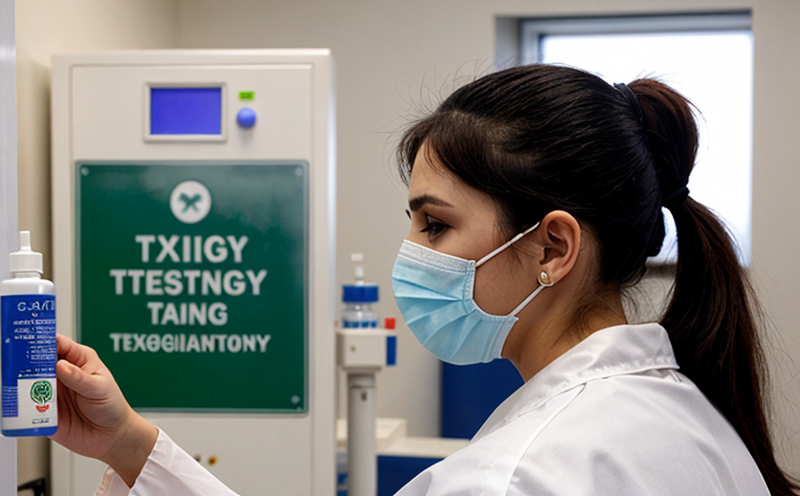Immunotoxicity Flow Cytometry Profiling Testing
The Immunotoxicity Flow Cytometry Profiling Testing service is designed to evaluate the potential immunological impact of pharmaceutical compounds and formulations in vivo. This testing ensures that new drugs do not adversely affect the immune system, which is critical for drug safety and regulatory compliance.
Flow cytometry, a powerful analytical technology, allows for detailed profiling of immune cell populations at the single-cell level. By analyzing multiple parameters simultaneously—such as cell surface markers, intracellular proteins, and functional responses—flow cytometry can provide comprehensive insights into how test compounds interact with various cell types within the immune system.
This service is particularly valuable in early-stage drug development where safety evaluations are crucial for selecting promising candidates that will progress to later stages of clinical trials. The ability to identify potential immunotoxicants at an early stage helps mitigate risks associated with adverse events observed during later phases, reducing both time and cost.
The testing process involves multiple steps, including the selection of appropriate cell types based on the drug’s mechanism of action (MOA), preparation of test compounds, administration protocols tailored to ensure accurate representation of real-world dosing conditions, and meticulous data collection using advanced flow cytometers. Our highly skilled team ensures that each step adheres strictly to international standards such as ISO 17025.
Upon completion of the study, detailed reports are generated highlighting key findings regarding changes in immune cell populations or functional responses following exposure to the test compound. These reports serve as critical inputs for decision-making processes within pharmaceutical companies and regulatory agencies alike.
To summarize, our Immunotoxicity Flow Cytometry Profiling Testing service offers a robust approach to ensuring drug safety by providing comprehensive evaluations of potential immunological effects early in the development process. This ensures that only safe compounds move forward into clinical trials, ultimately benefiting patients who rely on these medications.
Note: Please consult our dedicated page for more details on how our services align with international standards and regulatory requirements specific to your region.
Why It Matters
The immune system plays a pivotal role in maintaining health by protecting the body against pathogens, cancer cells, and other harmful invaders. Any disruption or imbalance within this system can lead to serious health issues ranging from mild allergies to life-threatening autoimmune diseases.
In the context of pharmaceutical development, ensuring that new treatments do not inadvertently harm the immune system is paramount. Immunotoxicity testing helps identify compounds that may cause adverse effects on various aspects of the immune response. This information is essential for drug developers as it guides modifications or discontinuation of potentially harmful substances early in the pipeline.
By incorporating immunotoxicity flow cytometry profiling into their testing protocols, pharmaceutical companies can enhance product safety profiles, thereby reducing risks associated with post-marketing adverse events. Regulatory bodies like the FDA and EMA increasingly emphasize the importance of such tests, making them a standard requirement for many drug applications.
- Enhances overall product safety by identifying potential immunotoxic effects early in development.
- Reduces late-stage clinical trial failures due to unexpected immune-related side effects.
- Promotes compliance with regulatory guidelines and standards.
The findings from these tests contribute significantly to the understanding of drug-induced toxicity, allowing for more informed decisions regarding dosage levels and formulation adjustments. Ultimately, this contributes to better patient outcomes and improved quality of life.
Scope and Methodology
| Step | Description |
|---|---|
| Sample Preparation | Cells are isolated from various sources such as blood, lymph nodes, or spleen depending on the compound's intended use. Cells are then cultured under conditions reflective of expected in vivo exposure. |
| Compound Administration | Test compounds are administered to cell cultures using dosages and routes consistent with typical clinical usage. |
| Data Collection | Flow cytometric analyses measure multiple parameters including expression levels of specific markers, activation states, and secretion patterns of cytokines. |
| Analysis & Interpretation | Statistical methods compare pre- and post-treatment data to determine significant changes indicative of immunotoxicity. |
The scope encompasses a range of in vitro models designed to mimic different aspects of the human immune system, ensuring broad coverage of potential interactions. The methodology strictly follows international standards such as ISO 17025 and ICH S6 guidelines to ensure reliability and reproducibility.
Our laboratory uses state-of-the-art flow cytometers capable of detecting even subtle shifts in cellular characteristics. Advanced software packages facilitate precise data analysis, enabling accurate interpretations that contribute valuable insights into the safety profile of each tested compound.
Environmental and Sustainability Contributions
- Eco-Friendly Reagents: We utilize reagents derived from sustainable sources whenever possible. This reduces our environmental footprint while maintaining high-quality standards.
- Efficient Use of Resources: By optimizing sample preparation techniques, we minimize waste generation throughout the testing process.
The data generated through this service can inform more targeted and efficient drug development processes, potentially leading to reduced resource consumption during later stages. Additionally, by minimizing adverse effects on the immune system, our tests contribute positively towards patient well-being without compromising environmental sustainability goals.





